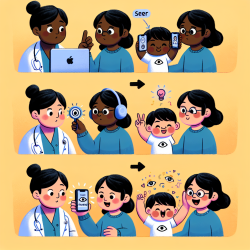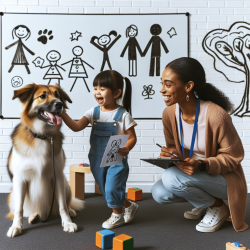Here, we summarize the key findings and provide actionable insights for improving your practice using data-driven approaches.
Key Findings
The Social Responsiveness Scale (SRS-2) was adapted and validated for use with deaf children. The modified tool, referred to as the "SRS-2 Deaf adaptation," was shown to have high internal consistency (Cronbach’s Alpha coefficient of 0.968) and strong test-retest reliability (Intraclass Correlation Coefficient of 0.897). The area under the Receiver Operating Curve (ROC) was 0.811, with an optimal cut-off value of 73, which gave a sensitivity of 82% and a specificity of 67%.
Practical Implications
Implementing the SRS-2 Deaf adaptation in your practice can significantly enhance the accuracy of ASD screening in deaf children. Here are some steps to consider:
- Training: Ensure that your team is trained on the nuances of the SRS-2 Deaf adaptation, including understanding the specific communication environments of deaf children.
- Communication Environment: Pay close attention to the child’s communication context. The SRS-2 Deaf adaptation includes an opening statement to guide respondents in considering the child’s preferred language and communication settings.
- Awareness of Cultural Differences: Be mindful of cultural differences in communication. For example, touching someone to gain attention is acceptable in deaf culture but may be misinterpreted in hearing culture.
- Use of Visual Tools: Incorporate visual aids and sign language in assessments to ensure that the child fully understands the questions and can respond accurately.
Encouraging Further Research
The study underscores the need for ongoing research to adapt and validate diagnostic tools for diverse populations. Here are some areas for future research:
- Broader Validation: Validate the SRS-2 Deaf adaptation in different countries and languages to ensure its applicability across various cultural contexts.
- Longitudinal Studies: Conduct longitudinal studies to assess the long-term effectiveness of using the SRS-2 Deaf adaptation in clinical practice.
- Parent and Clinician Training: Investigate the impact of training parents and clinicians on the use of the SRS-2 Deaf adaptation in improving diagnostic accuracy.
Conclusion
The SRS-2 Deaf adaptation is a promising tool for screening ASD in deaf children, offering high reliability and validity. By integrating this tool into your practice, you can enhance the accuracy of your assessments and improve outcomes for deaf children.
To read the original research paper, please follow this link: Modifying and validating the social responsiveness scale edition 2 for use with deaf children and young people.










